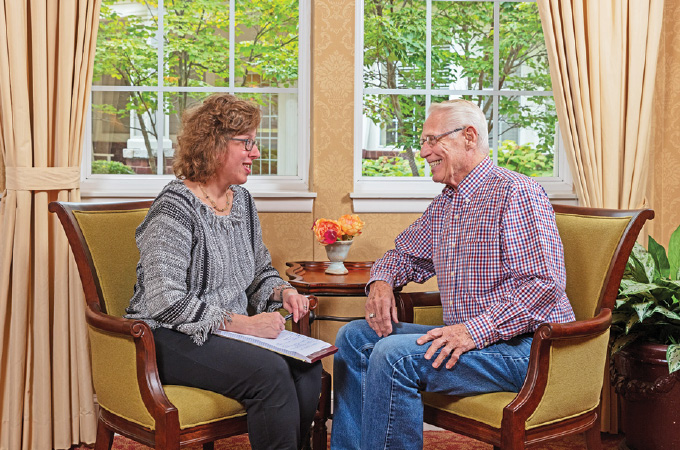Alzheimer’s disease is a study in contrasts for adults who have the condition. It causes dementia and loss of function and can bring alternating stages of calm and irritability, acceptance and resistance, clarity and confusion, says Dr. Aviva Raskas, consulting psychiatrist at the Parc Provence memory care community in Creve Coeur.
She explains that because the disorder has such wide-ranging effects, it’s important for residents to be supported, protected and engaged, and at Parc Provence, caring providers and staff ensure that happens. “In the beginning, most people with Alzheimer’s recognize that they are losing their memory, and they often become frustrated about forgetting and misplacing things,” Raskas notes. “They learn ways of disguising their forgetfulness because the embarrassment can be very tough to handle. Social isolation often starts to creep in, so staff members are well versed in recognizing the signs and providing necessary help.”
Over time, patients’ awareness of their situation starts to decrease, according to Raskas. “As memory loss progresses, they become less in tune with it,” she says. “It literally becomes harder to remember that you are forgetful. Some people struggle with anxiety and depression, while others seem to become more content and relaxed. Patients may begin one way but not continue on that path; they can switch from being short-tempered to pleasant, or vice versa. The experience is different for each person.”
According to Raskas, Parc Provence staff members work as a team to ensure residents stay mentally and physically active for their own well-being. “The community offers an extraordinary amount of positive programming,” she explains. “Activities are easily accessible, stimulating and appropriate for people in different stages of memory loss. They also help residents interact with each other, which is incredibly important.” There are opportunities for exercise, music and art therapy, movies, speaker presentations, outings to restaurants and attractions, and much more. Many residents have backgrounds in areas like education and fine arts, so related activities often bring back mood-lifting memories, Raskas says.
She adds that research shows regular social interaction and personal attention are very important to an Alzheimer’s patient’s quality of life. For that reason, staff relationships with residents go far beyond just talking and visiting. “Our team members are adept at familiarizing themselves with the priorities of each person,” she notes. “Employees can create bonds because they understand residents’ likes, dislikes and life experiences. And as the disease progresses and verbal communication becomes more difficult, staff members come up with other meaningful ways to engage.”
November is Alzheimer’s Disease Awareness Month, and Raskas says it’s an ideal time for families to educate themselves about the condition, which affects nearly 6 million Americans. “Memory loss tends to slip in the door quietly, and people often don’t recognize the early stages,” she notes. “Parc Provence makes sure each resident feels at home in a safe, protected and caring environment.”
The Parc Provence memory care community in Creve Coeur, led by administrator Kathy Aragon, is part of The Gatesworth family of senior residences. Pictured on the cover: Dr. Aviva Raskas. For more information, call 314.542.2500 or visit parcprovence.com.
Pictured at top: Psychiatrist Dr. Aviva Raskas visits with a resident.
Photo courtesy of Parc Provence
Cover courtesy of Parc Provence
